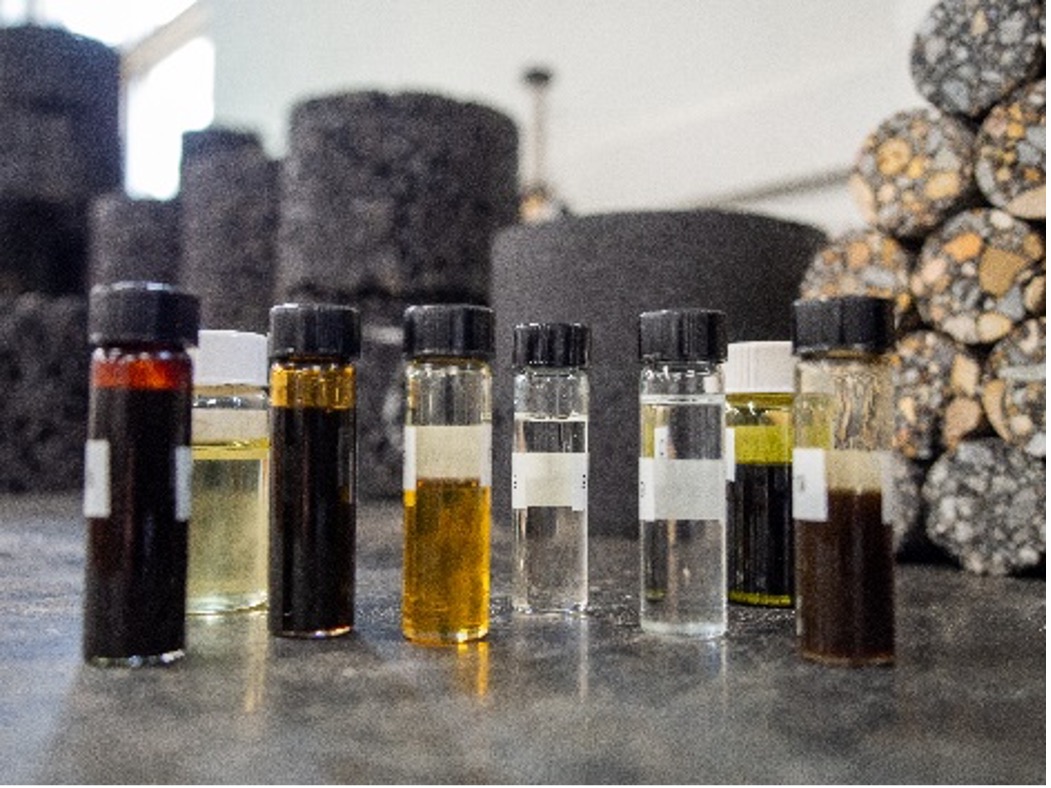- Fall 2022
NCAT Continues to Serve as NTPEP Testing Laboratory
Since summer 2019, NCAT has served as the designated testing lab for the National Transportation Product Evaluation Program’s (NTPEP) technical committee on warm mix asphalt (WMA). Through this collaboration, NCAT has evaluated 23 WMA and anti-strip additives (ASA) over the last three years and is evaluating eight new products in the current testing cycle.
In spring 2022, NTPEP expanded and renamed the committee to include the evaluation of recycling agents for recycled asphalt mixture applications, called the Asphalt Mixture Additives (AMA) committee. Adding the evaluation of recycling agents will significantly benefit state highway agencies, material suppliers, and asphalt contractors as the industry progresses toward the “The Road Forward” initiative to achieve net zero carbon emission asphalt pavements by 2050.
Using RAP and RAS in asphalt mixtures can provide significant economic and environmental benefits if the pavement meets performance expectations. However, asphalt mixtures containing high RAP/RAS contents can be susceptible to pavement cracking and durability issues because the aged asphalt binder in RAP/RAS is stiffer and more brittle than virgin binder. Numerous studies have shown that adding a recycling agent has the potential to improve the cracking resistance of high RAP/RAS mixtures, but effectiveness varies greatly from product to product. Many state agencies have evaluated recycling agents through lab testing and field projects, but they generally lack a robust procedure to assess these materials for product approval purposes. Fortunately, this dilemma has a potential solution thanks to the NTPEP AMA committee.
Like the previous committee, the AMA committee offers work plans that are intended to compare a mix containing an asphalt additive (e.g., WMA, ASA, or recycling agent) to a control mix with the same mixture components and proportions to determine the additive’s impact on mix properties. According to the AMA work plan, the evaluation of recycling agents is a five-step process—
- Fingerprint the recycling agent using Reflectance-Fourier Transform Infrared Spectroscopy (FTIR).
- Determine the dosage of the recycling agent by targeting a 6.0°C decrease in the continuous high-temperature performance grade of a PG 64-22 virgin binder.
- Determine the continuous grade (per AASHTO T 313, T 315, and T 350), non-recoverable creep compliance (Jnr) and percent recovery (per AASHTO T 350), and Delta Tc (ΔTc) after 20 and 40 hours of PAV aging (per AASHTO TP 113) of a PG 64-22 virgin binder with and without the recycling agent.
- Verify the volumetric properties of a 45% RAP mix design after adding the recycling agent.
- Evaluate the rutting, moisture, and cracking resistance of the same 45% RAP mix design with and without the recycling agent using the Hamburg Wheel Tracking Test (HWTT, per AASHTO T 324), Indirect Tensile Asphalt Cracking Test (IDEAL-CT, per ASTM D8225), and Overlay Test (OT, per the modified Tex-248-F). The HWTT and OT will be conducted on specimens with short-term aging per AASHTO R 30, while the IDEAL-CT will be conducted on specimens at two aging conditions: 1) short-term aging per AASHTO R 30 and 2) long-term aging by further conditioning the short-term aged loose mixture for additional eight hours at 135°C.
Note: A detailed work plan can be found on the NTPEP website.
NCAT researchers have been working on a 45% RAP mix design to evaluate recycling agents through the AMA committee. It is anticipated that NTPEP will open the first submission cycle for recycling agents in October 2023. In the meantime, NTPEP will open two submission cycles for WMA and ASA additives on October 1, 2022, and April 1, 2023.


For more information about this article, please contact Fan Yin.